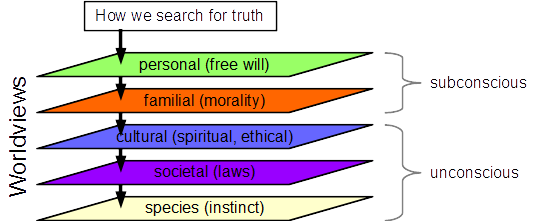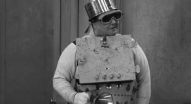What IS Truth?
“Truth” is one of those peculiar concepts that cannot be precisely defined. The typical dictionary will state, “conformity with fact or reality.” So you look up “fact” and find out that it is “something that is true” and end up running in circles. And we all know that “reality” is just an illusion, anyway.
“Truth” derives from the Latin veritas, a concept that means “verifiable,” something that actually exists as experience or observation. What people miss is that opinion often masquerades as truth. So, how do these two get mixed up?
 We obtain information on the world about us from two sources: our sensations (the spatial senses) and our intuition (the temporal senses). Sensation is valued by thinking and intuition is valued by feeling. (This is a classic Jungian concept of rational and irrational valuing.) Valuing, itself, is just how important we determine something to be, typically based on ego gratification. We give the highest value to things that make us feel good and give us power. So when it comes down to that juicy, fatty bronto burger or a Tofu latte… I know what I will choose!
We obtain information on the world about us from two sources: our sensations (the spatial senses) and our intuition (the temporal senses). Sensation is valued by thinking and intuition is valued by feeling. (This is a classic Jungian concept of rational and irrational valuing.) Valuing, itself, is just how important we determine something to be, typically based on ego gratification. We give the highest value to things that make us feel good and give us power. So when it comes down to that juicy, fatty bronto burger or a Tofu latte… I know what I will choose!
Because all the information we receive from space and time are weighed and valued by personal needs and experience, we can never see the truth—so truth is always subjective, based on our extensive system of values, termed a Weltanschauung or Worldview. If you believe truth is objective, consider that mankind cannot even decide on the shape of the world—flat, round, flat again, oblate spheroid, geoid, hypersphere, n-dimensional membrane—whatever happens to be in vogue this year.
 The Worldview is like a gigantic puzzle inside our minds with pieces missing and a bunch of them in the wrong place, because we don’t really know what connects them to other sections. We’ve hooked together some bits of sky, that pond and that tree over in the field, because it was obvious those puzzle pieces belonged together. But the holes between what we’ve assembled… that is what we seek to fill by searching for “truth.” And we will only accept the “truth pieces” that actually fit in to the dents and wiggles of the pieces we’ve already assembled.
The Worldview is like a gigantic puzzle inside our minds with pieces missing and a bunch of them in the wrong place, because we don’t really know what connects them to other sections. We’ve hooked together some bits of sky, that pond and that tree over in the field, because it was obvious those puzzle pieces belonged together. But the holes between what we’ve assembled… that is what we seek to fill by searching for “truth.” And we will only accept the “truth pieces” that actually fit in to the dents and wiggles of the pieces we’ve already assembled.
Many times, we encounter puzzle pieces that don’t seem to fit anywhere, so we reject them as “falsehoods,” even though they may not be. In this “disinformation age,” the pieces we’ve already assembled were handed to us, pre-assembled, by those that wish to control what we seek when searching for the truth. Sometimes, we have to rip out whole sections of our puzzle because we just tried to place a skyscraper into a seascape, and no matter how we try, we’ll never find the connecting pieces because they do not exist. But that never stops people from looking, and more importantly, inventing pieces to fit.
Layers of Truth
There is another way we can fill in our gap-ridden worldview by stacking puzzles one on top of another. That way, if we have a hole in ours, we might be able to see the “answer” deeper down at a different level. This onion-skin wrapping of values is well known in psychology and there are five primary levels:
- The personal worldview, which is built from the experiences and observations of this life and the carryover from past incarnations (karma, unfinished business, etc). Choices made from our personal worldview are considered to be free will choices.
- The familial worldview that we inherited from our family and friends, normally taught to us as an early age as the “acceptable behavior” we refer to as morality.
- The cultural worldview, the generational knowledge of the culture we were raised within that is primarily a spiritual or religious worldview, from which we pattern our ethical behavior.
- The societal worldview, a body of proper behavior that is dictated by those rule us, to create social interactions with specific outcomes. Laws for the body, codes of conduct for the mind.
- The species worldview, inherent in our biology and archetypal makeup that come with just being human, forming our instinctual behavior. When all else fails, “the buck stops here” and we react instinctively, rather than act based on what we’ve learned. The species worldview is the only complete worldview—no holes.
 Prior to the 20th century, the personal worldview was extensive—one huge puzzle with many pieces filled in, as mankind was still curious about the world around him and engaged in extensive research, observing Nature and trying to duplicate what Nature was doing to understand how it worked. Researchers of that era had a difficult time obtaining and sharing information, as the communication technology we now have did not exist—no phones, Internet, television, radio talk shows, YouTube, etc. They were limited to a somewhat unreliable postal service, with international correspondence almost impossible—letters would take weeks or months to arrive, if they got there at all.
Prior to the 20th century, the personal worldview was extensive—one huge puzzle with many pieces filled in, as mankind was still curious about the world around him and engaged in extensive research, observing Nature and trying to duplicate what Nature was doing to understand how it worked. Researchers of that era had a difficult time obtaining and sharing information, as the communication technology we now have did not exist—no phones, Internet, television, radio talk shows, YouTube, etc. They were limited to a somewhat unreliable postal service, with international correspondence almost impossible—letters would take weeks or months to arrive, if they got there at all.
 The 1950s brought the popularization of radio and television and the familial worldview began to fill in. Worldviews could now be shared with many people as stories. Families would sit together to listen to a radio play or watch The Honeymooners on the television—and tended to all watch the same shows, so behavior moved into the familial worldview and out of the personal. It wasn’t because you wanted something this way, it was the way the family did it.
The 1950s brought the popularization of radio and television and the familial worldview began to fill in. Worldviews could now be shared with many people as stories. Families would sit together to listen to a radio play or watch The Honeymooners on the television—and tended to all watch the same shows, so behavior moved into the familial worldview and out of the personal. It wasn’t because you wanted something this way, it was the way the family did it.
In the United States, a “melting pot” of culture, the cultural worldview never had much hold in the psyche because the United States never developed a cultural identity and immigrants were tending to flee the cultures they had lived in. In the mono-culture peoples, religion tended to be the controlling factor that is manipulated by those that run the churches—the first level of control of The Powers That Be.
The societal worldview is the most significant one, as mankind is a very social creature and needs a fixed set of rules for society interaction that crosses cultural and familial boundaries. And someone needs to write those rules—and those that made the rules became the rulers of society, originally the Royalty and now the New World Order.
The species worldview has remained fairly constant, but only provides the instinctual parts of the puzzle—how we behave when we do not have “learned behavior” to fall back upon. Because instinct is the basis of the survival mechanism, an inability to value at this level will normally result in death.
Now that we see how things “stack up,” it becomes a fairly simple matter to manipulate what fits into a person’s collective worldview—their “truth.”
What You Cannot Control, Destroy
 The personal and familial worldviews are normally subconscious, that fuzzy area between active consciousness and the reactive unconscious. As such, they are difficult to modify because they are protected by the Ego. We all know how difficult it is to change someone’s mind, particularly if they highly value the point in question. This also applies to the familial worldview, as the group ego will protect the morals learned by the family group (biologic or close friendship).
The personal and familial worldviews are normally subconscious, that fuzzy area between active consciousness and the reactive unconscious. As such, they are difficult to modify because they are protected by the Ego. We all know how difficult it is to change someone’s mind, particularly if they highly value the point in question. This also applies to the familial worldview, as the group ego will protect the morals learned by the family group (biologic or close friendship).
The species worldview is biologic, so it is very difficult to manipulate—unless you manipulate the underlying biology (genetics) of the species in question. Mankind has gotten to this point, but still lacks sufficient understanding of the system to effectively exploit it (lacks the 3D time concept of the mind).
The cultural and societal worldviews are behaviors that are taught by religious/spiritual and political institutions. As such, they are the easiest to manipulate through propaganda and marketing campaigns. But in order to reach them, one must get past the personal and familial worldviews—what you cannot control, you destroy. They must go, so The Powers That Be can get The Power They Want.
Religion and politics have gone hand-in-hand for centuries and not much can be done about the species, itself. So the first target up on the “hit list” was the familial worldview—the breakdown of the family unit and preventing close relationships from being formed between friends.
This started in the 1970s with the “village” movement, where it “takes a village” to raise a child—not parents. Add in daycare to pull the young, impressionable minds away so they only learn societal values and not familial ones. Anyone over 40 years of age has noticed what has happened to the family over the years and there is abundant material available on this topic, so details are not necessary. We just have to face that the conventional family concept, and associated worldview, are now gone.
That left the personal worldview, what used to be called character. Life experience taught us right from wrong, good from evil. In order to punch holes in the personal worldview, mankind needed to be disconnected from the experiences of life—Nature. And this was done through a concept known as over-socialization. Move any personal values into the societal worldview, by trickery, force or coercion, and The Powers That Be control those values.
The term “over-socialization” gets a lot of negative press, because if people became aware of what was going on, they would rebel against it and “make it personal.” This is seen in concepts such as sovereignty and individuality movements, but is becoming increasingly rare because the tools used to suppress individuality are the ones misinterpreted as rebelling against society. And these are the same tools used in mind control: drugs (alcohol, tobacco, recreational, etc) and technology.
 Drugs dull the mind to the point where valuing must rely on the unconscious for problem-solving, since familial valuing has already been destroyed. With enough use, the mind stops trying to store data in the personal worldview and defaults to societal programming—though the user will firmly believe it is their free-will choice. If you notice, there are very few “free thinkers” these days, but many thousands of “regurgitators” pushing that “share” button—without comment—in an attempt to simulate an impression of creative thought.
Drugs dull the mind to the point where valuing must rely on the unconscious for problem-solving, since familial valuing has already been destroyed. With enough use, the mind stops trying to store data in the personal worldview and defaults to societal programming—though the user will firmly believe it is their free-will choice. If you notice, there are very few “free thinkers” these days, but many thousands of “regurgitators” pushing that “share” button—without comment—in an attempt to simulate an impression of creative thought.
Technology has now become the “opiate of the masses.” It has removed the biological need to remember information and experience, with the result of blanking out the personal worldview. It is rare for a person to actually have an opinion of their own, the most common response given is that “so and so said so.” When it goes to “so and so,” then you’ve fallen through a hole in the personal and familial worldviews, and dropped in to the programmable cultural and societal worldviews. “Truth” by consensus—not observation or experience. This is not truth, but a deception.
As I am fond of saying, everything you know is backwards. When you want to push a person’s values away from something they would naturally be attracted to, you present it as its opposite, so that pull becomes a push. The societal worldview is deliberately designed to present everything backwards in order to keep you far from veritas, that which actually exists in Nature and can be observed and experienced.
The Way Out
The bulk of humanity is happy being sheeple, being told what to do and how to act. But if you’re reading this paper, you fell through one of those rabbit holes and are seeking to find some answers to life, the Universe and everything. To do that, stop accepting what you are told is “truth,” as it is nothing more than opinion. Engage in research as the old-timers did to find answers for yourself—and have personal opinions. And remember veritas—observation and experience leads to truth, which requires the use of your body, mind and spirit.
When you are confronted with an experience that does not fit into your worldviews, don’t reject it because you can’t figure out where that piece fits in the puzzle. Consider it… do a “what if” that piece actually belongs in this part of my worldview, then how does it change things? And if the change is better than what you already have, make it part of your personal worldview and see what happens.
The Universe is actually a simple place based only on space and time, tending to follow Occam’s Razor, “all other things being equal, the simplest solution is usually the right one.” Truth makes understanding simpler, though on the surface, it may not seem so because one has to “undo” so many falsehoods that have been adopted as truth. As Dewey Larson, creator of the Reciprocal System of theory said, “Complexity is entertaining; simplicity is not.”
Give simplicity a chance.